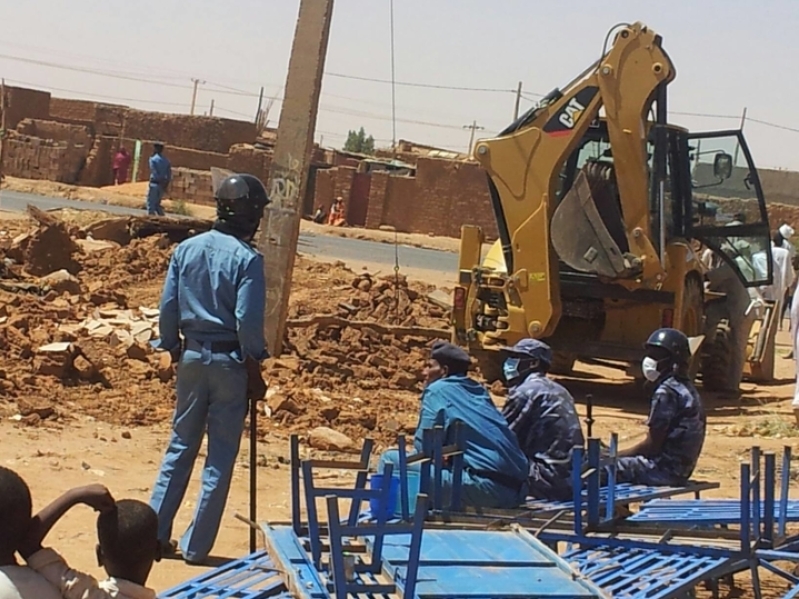
In an ongoing bid by the government of Sudan to take over leadership of the Sudanese Church of Christ (SCOC), police on Sunday (Oct. 22) arrested five SCOC church leaders after they refused to comply with an order to refrain from worship, sources told Morning Star News.
Police officers arrived at the SCOC-Harat church in the Hai Al Thawra West area of Omdurman and ordered the Christians to cancel the worship service. Omdurman lies across the Nile River from Khartoum. When the church leaders refused, police arrested them, the sources said.
One source told Morning Star News that they were charged with disturbing the public before they were released late last night. Angry police spoke harshly to them during the arrest, threatening that they would not be released, the source said, but after questioning they were released at 11 p.m.
Three pastors were detained - the Rev. Ayoub Tiliyan, SCOC moderator; the Rev. Ali Haakim Al Aam, pastor-in-charge of the block 29 congregation; and pastor Ambrator Hammad, sources said. Two evangelists, Habill Ibrahim and elder Abdul Bagi Tutu, a member of the SCOC presbytery, were also arrested, they said.
The harassment came after police in Sudan detained and questioned another church leader in Omdurman last month and, in August, seven other church leaders were arrested, interrogated and released on bail. Elder Mahjoub Abotrin of the SCOC was arrested from his home in Omdurman on Sept. 22 and was interrogated before he was released. Sources said he was arrested because of his refusal to hand over SCOC leadership to government-appointed leadership.
The current leadership expires on March 2018. The SCOC constitution calls for a general assembly every three years to appoint church leaders.
On Aug. 23, seven church leaders were arrested, jailed for six hours and interrogated for refusing to comply with a government order to hand over church leadership to the government's committee. The leaders were released on bail after authorities told them to comply with the government order, which they roundly rejected.
The Rev. Kwa Shamaal (also transliterated Kuwa Shamaal), SCOC head of missions, and the Rev. Ayoub Mattan, SCOC moderator, were among the church leaders arrested. Pastor Shamaal was previously arrested on Dec. 18, 2015 and acquitted on Jan. 2 this year of charges ranging from spying to inciting hatred against the government.
Pastors Mattan, Shamaal and the others are still members of the legitimate executive committee of the SCOC.
Another SCOC pastor, the Rev. Hassan Abdelrahim Tawor, had received a 12-year sentence earlier this year after being charged with spying and trying to tarnish Sudan's image, but he was freedalong with Abdulmonem Abdumawla of Darfur on May 11 after receiving a presidential pardon.
He had been arrested along with Pastor Shamaal in December 2015. They were convicted on baseless charges of assisting Czech aid worker Petr Jasek - pardoned and released on Feb. 25 - in alleged espionage, causing hatred among communities and spreading false information, according to their attorney.
Foreign diplomats and international rights activists took notice of the case after Morning Star News broke the story of the arrest of pastors Abdelrahim Tawor and Shamaal. Their arrests were seen as part of a recent upsurge in harassment of Christians.
Most SCOC members have roots among the ethnic Nuba in the Nuba Mountains of Sudan's South Kordofan state, where the government is fighting an insurgency. The Nuba along with other Christians in Sudan face discrimination and harassment, as Sudanese President Omar Al-Bashir has vowed to introduce a stricter version of sharia (Islamic law) and recognize only Islamic culture and Arabic language.
In its campaign to rid the country of Christianity, Sudan has designated 25 church buildings for destruction, and on Aug. 2 it demolished a Baptist church in Omdurman. On May 7 Khartoum state authorities in Sudan demolished a church building in the Khartoum suburb of Soba al Aradi, which began as a refugee camp for south Sudanese. A bulldozer sent by Jebel Aulia locality and the Ministry of Planning and Urban Development destroyed the SCOC building.
Authorities had notified church leaders of the impending demolition just a week prior. The government reportedly claimed the churches were built on land zoned for residential or other uses, or were on government land, but church leaders said it is part of wider crack-down on Christianity.
Harassment, arrests and persecution of Christians have intensified since the secession of South Sudan in July 2011. The Sudanese Minister of Guidance and Endowments announced in April 2013 that no new licenses would be granted for building new churches in Sudan, citing a decrease in the South Sudanese population.
Sudan since 2012 has expelled foreign Christians and bulldozed church buildings on the pretext that they belonged to South Sudanese. Besides raiding Christian bookstores and arresting Christians, authorities threatened to kill South Sudanese Christians who do not leave or cooperate with them in their effort to find other Christians.
Sudan fought a civil war with the south Sudanese from 1983 to 2005, and in June 2011, shortly before the secession of South Sudan the following month, the government began fighting a rebel group in the Nuba Mountains that has its roots in South Sudan.
Due to its treatment of Christians and other human rights violations, Sudan has been designated a Country of Particular Concern by the U.S. State Department since 1999, and the U.S. Commission on International Religious Freedom recommended the country remain on the list in its 2017 report.
Sudan ranked fifth on Christian support organization Open Doors' 2017 World Watch List of countries where Christians face most persecution.






